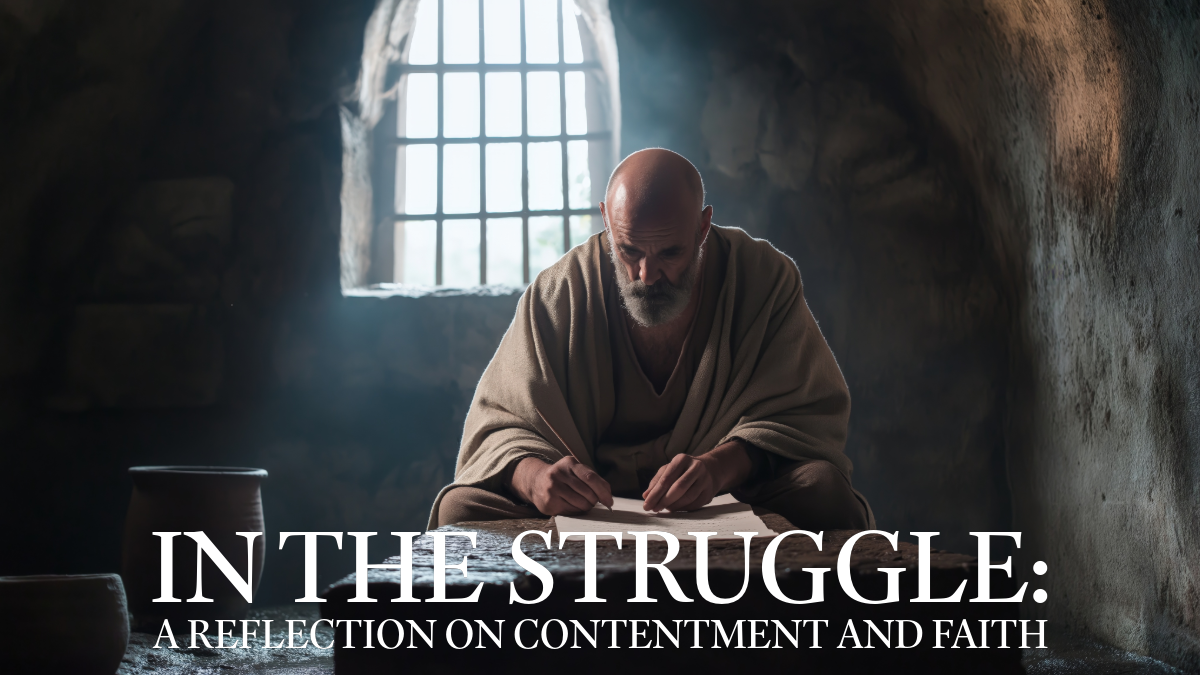In the Struggle: A Reflection on Contentment and Faith
The apostle Paul wrote:
“I rejoiced in the Lord greatly that now at length you have revived your concern for me. You were indeed concerned for me, but you had no opportunity. Not that I am speaking of being in need, for I have learned, in whatever situation I am, to be content. I know how to be brought low, and I know how to abound. In any and every circumstance, I have learned the secret of facing plenty and hunger, abundance and need. I can do all things through him who strengthens me. Yet it was kind of you to share my trouble … And my God will supply every need of yours according to his riches in glory in Christ Jesus.” (Phil.4:10–14, 19)
In verse 11, Paul uses the word “content.” The Greek term here, used only once in the New Testament (TR Greek text), means “self-sufficient, independent of external circumstances, satisfied with one’s life and means.” This is not a passive resignation, but a spiritual maturity rooted in faith.
Why, or more precisely, how is Paul content in his circumstance? Let’s be clear: his situation is not ideal. He writes from confinement, yet his heart is free.
Contrast this with Korach in Numbers 16, a man discontent despite divine provision. Korach, a Levite with sacred responsibilities, enjoyed miraculous sustenance: manna, water from the rock, clothing that never wore out. Yet he incited rebellion against Moses and Aaron, driven by envy and entitlement.
Korach’s story warns us: discontentment can flourish even in abundance. So how do we guard our hearts from becoming like his? Paul offers the antidote: “I can do all things through him who strengthens me.” (Phil. 4:13).
Paul’s contentment wasn’t innate. He says, “I have learned…” It was not a spiritual gift bestowed in a moment, it was cultivated through experience, through faith, through struggle.
Scripture teaches that contentment is not a goal to chase, but a fruit that matures in faith. As we trust the Living God, we begin to experience satisfaction, not because our circumstances change, but because our hearts do (cf. 2 Cor. 1:20).
Paul’s strength came from Messiah Yeshua/Jesus, his: provision, endurance, peace, and salvation. Fixing our hearts and minds on Yeshua keeps us from fixating on things that breed discontentment and rebellion.
Messiah taught: “But seek first the kingdom of God and his righteousness, and all these things will be added to you.” (Matt. 6:33).
And the author of Hebrews exhorts: “Keep your life free from love of money, and be content with what you have, for he has said, “I will never leave you nor forsake you.” (Heb. 13:5).
Dear reader, dissatisfaction often finds companions, those who will echo your complaints and validate your blame. But blessing is often best recognized in hindsight, or when disruption reveals how much we had. Find a voice that reminds you of your blessing; and be that voice for others.
Paul does not blame his jailers or those who delayed their help. He sees his situation as held in the sovereign hands of God. Yet he also receives the gift from the brethren with gratitude, recognizing their faith and concern, even from their lack.
This is another lesson: contentment does not reject help. It receives it with humility and thanks. It produces brotherly affection and concern, an antidote to the spirit of Korach.
Remember this in your times of struggle:
Messiah is your strength.
Messiah is your provision.
Messiah is your endurance.
Messiah is your peace.
Messiah is your salvation.
“God is our refuge and strength, a very present help in trouble” (Ps. 46:1), this psalm incidentally was written by the sons of Korach.
Maranatha. Shalom.
Bp. Justin

